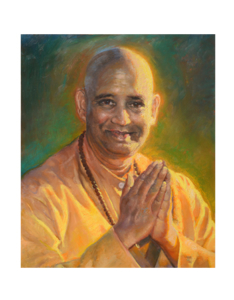You Are Not A Slave to the
Moods of the Mind
Human embodiment is the product of mixed karmas. When good karmas of the past begin to operate, there is increasing sattwa (purity) in the mind. On the other hand, when a negative karma of the past is operative, the mind gradually sinks into restlessness, gloom, and despair caused by increasing rajas (the principle of externalization and passion), and tamas (the principle of inertia).
The moods of the mind vary. Sometimes the mind is like the sky filled with the joyous expression of soaring swans. Sometimes it is laden with the shrieks of ravens and vultures, and sometimes it is overcast with dark clouds.
During different moods, a human being behaves differently. He becomes Divine during a sattwic mood and expresses understanding towards the problems of others. He is kind, compassionate, enduring, patient, tender, and considerate. When overpowered by rajas however, his serene face grows tense. He is quick to misunderstand and quick to lose his temper. People dread to approach a person during an angry mood. Even one’s dear relatives are often unable to communicate with him or her.
When tamas dominates the mind, the mood tends to sadness, depression, sorrow, dullness, cruelty, and manifold perversions of understanding. During such a state one loses the power of introspection. Gross sentiments continue to dominate, and a person may sustain hatred and vengefulness for a long, long time.
Dominated by the operations of these three gunas (modes of nature), a person appears to be possessed by many different personalities. When godly entities operate through him, he expresses goodness through his personality. When ungodly entities operate through him, he succombs to many weaknesses, vices, and frailties of human nature. And when demoniac forces take hold of him, he becomes a sub-human creature filled with unimaginable ugliness.
An aspirant must develop the art of reflection. He should aim at transcending the three gunas in order to be free of the many moods of the mind. Yoga presents a multi-faceted approach that can lead one to transcend the gunas and ultimately attain to the state of freedom.
When tamas dominates the mind, allow yourself to be in satsanga (good association). Do not maintain a gloomy state of mind for an extended period of time. Engage in fruitful activities, serve others, and keep yourself busy. Do not impress upon your mind the idea that you are incapable of ascending the heights of yoga and become identified with a tamasic state of mind. This state of development does not belong to you, it will soon pass on.
When tamas operates through the body, causing laziness, sleep, and inertia, you should do yoga exercises and practice pranayama to create sattwic vibrations. You should also take a sattwic diet – food consisting of fruits, vegetables, nuts, milk, and other nutritious food. Maintain a healthy pattern of life day by day.
When rajas invades your mind, you’ll be caught in a world of numerous desires. You will scheme, plan, and involve yourself in many senseless activities – all of which create increasing problems for you. Tamas needs to be controlled by rajas, but rajas needs to be channeled into sattwa.
When sattwa develops, your mind becomes serene and placid, and your body becomes filled with refreshing vitality. Your senses also become keen and healthy. The sattwic mood must eventually pass on however, and this leads the human mind to create various illusions on the basis of sattwa. It develops the idea that happiness proceeds from the object of the world, and thus becomes dependent upon them. It develops the vanity of feeling wise, and this creates egoism. Sattwa binds a person by creating attachment to pleasure and vanity pertaining to knowledge.
The plan before an aspirant is to promote a longer duration of sattwa in his personality. He must channel and sublimate rajas into sattwa. During the predominance of rajas, he should seek wise counsel, serve his spiritual preceptor, and perform selfless actions. Be active, but with a purpose and vision. Practice concentration and meditation in order to control rajas, and practice physical and mental relaxation to cultivate sattwa.
When sattwa does indeed develop, turn your mind to the Divine Self. Reflect and inquire, “Who am I?” Intensify japa, prayer, and meditation. Do not allow the opportunity of sattwa to slip by. If you do, then you intensify the impressions of vanity and illusion. Sattwa has the power to release the mind from the burden of illusions. However, the same sattwa, when ignored and taken advantage of by the ego, will once more begin to fill the mind with illusions.
Study the state of a sage who has gone beyond the three gunas as described in the Bhagavad Gita. Learn to observe your mood as an impartial witness. When sattwa arises, do not swing to elation. Watch and sow seeds of good karma. When rajas develops, practice detachment and meditate upon the illusory nature of the objects of the world. At the same time, channel your energy in the selfless actions. When tamas develops, watch the negative thoughts without being identified with them. Assert within yourself, “Even this will pass away,” and do not intensify evil karmas during the rajasic and tamasic states of your mind.
What you earn through sattwa is dissipated through rajas and tamas. The fabric of good karma that is diligently woven doing sattwa is unwittingly undone during rajas and tamas. While sattwa plants the seeds of spiritual aspiration, rajas and tamas stealthily introduce the seeds of thorny bushes that thwart the growth of spiritual qualities in life. While sattwa presents wondrous opportunities, rajas ignore them, and tamas changes them into adversities.
Live to wage a perpetual war against the forces of rajas and tamas. And since even the states of sativa belong to the modifications of the mind, your goal is to discover the Self that transcends both the mind and the three gunas of which the mind is constituted. Increasing sattwa enables you to develop para vairagya (supreme dispassion) – the aspiration to turn away from the mind itself, and to abide in the Self. It is para vairagya that enables an aspirant to enter into nirbija samadhi – the state in which the seeds of birth and death of burned up completely.
You are not a slave to the passing moods of the mind. You are the very treasure of all that is Good, Beautiful, and True! Discover your essential nature by transcending the gunas and enjoy the infinite bliss and freedom of Self-realization.




